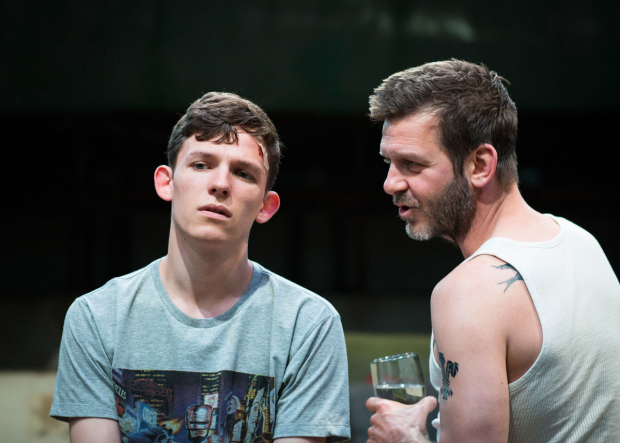Violence and Son (Royal Court)

© Helen Maybanks
Violence – his real name's Rick (Jason Hughes) – is as unreconstructed as a freshly smashed plate. He eats with his mouth open and he drinks, shags and fights. His 17 year-old son Liam (David Moorst) couldn't be more different: a Doctor Who obsessive, as sexually repressed as he is tentative. They've only known each other six months, when Liam moved in after his mother's death, and neither really gets the other.
Tonight, back from a comic convention in Cardiff, Liam agonises about putting the moves on his schoolfriend Jen (Morfydd Clark) – the Amy Pond to his Doctor. She's got a boyfriend, but she's giving off signals as well; not saying yes, not saying no. It's a game Rick knows all too well – cat and mouse – and he schools and nudges his hesitant son into a more direct approach.
Masculinity's under the microscope here: Liam's ineffectual gentleman against Rick's go-get-em alpha male. Owen acknowledges that there's something in both, but he never lets either off the hook and the more Rick drinks, the more he grows into his nickname – especially when goaded on by his clever-dick son. Class differences come into play as well – something drawn out by Cai Dyfan's in-the-round, bear-pit staging which seats some of us on plush leather and others in the sort of white plastic chairs that football hooligans used to throw at one another.
Really, the play is a string of ethical dilemmas and Owen dives headfirst into the greyest of grey areas. Beneath the surface, it's a study of consent and culpability. By staying with Rick, aware that the beatings will likely escalate, is Liam tacitly complicit in his own fate? Does 'no' still mean no when one's actions might seem to indicate a big, fat yes? Can men ever really curtail their inner caveman – and should they be held responsible for him?
One extraordinary segment recalls Rick's having hit a man with learning disabilities for touching up his girlfriend Suze (Siwan Morris, laid back and lascivious). Jen, meanwhile, talks of wearing jeans to ward off wandering hands in lively local pubs. Owen carefully probes the gaps between assent and acceptance, and between victim and culprit.
Big questions and, thankfully, not a clear-cut answer in sight – but the dilemmas do tend to stall the action. It's a play spent umming and ahhing; a will-he-or-won't-he-kind of play that dilly-dallies as it deliberates. Owen never lets it off the leash and, ironically enough, it can be constrained by its self-control. Director Hamish Pirie has to artificially induce a sense of danger by giving Rick a sledgehammer that he may or may not use. Chekhov's gun has to go off. This is Pirie's red herring.
It's best as a character piece – helped by finely tuned performances. Each role has its contradictions. Beneath his aggression, Rick's trying to be a loving father as best as he knows, and Hughes makes his shame clear, skulking sheepishly in after losing his temper. Liam's nature gets the better of him too: Moorst might shut his eyes to say the word 'shagging', but they still drift over to Jen's short skirt. Clark treads a fine tightrope between coy and come-get-me, without ever suggesting that Jen has all the answers. After all, who does?
Violence and Son runs at the Royal Court until 11 July










